Unit 13 We're trying to save the earth! Section A (1a~2d)课件(43张PPT)+内嵌音视频
文档属性
| 名称 | Unit 13 We're trying to save the earth! Section A (1a~2d)课件(43张PPT)+内嵌音视频 | 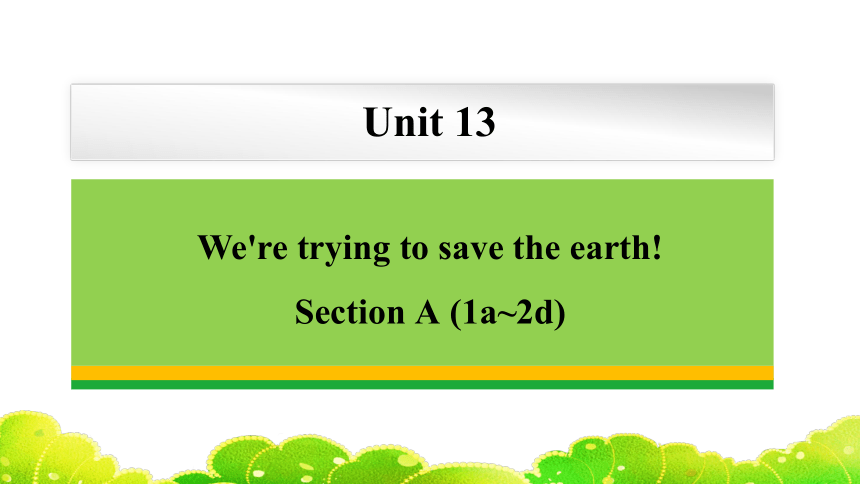 | |
| 格式 | pptx | ||
| 文件大小 | 78.4MB | ||
| 资源类型 | 教案 | ||
| 版本资源 | 人教新目标(Go for it)版 | ||
| 科目 | 英语 | ||
| 更新时间 | 2024-01-12 21:14:06 | ||
图片预览

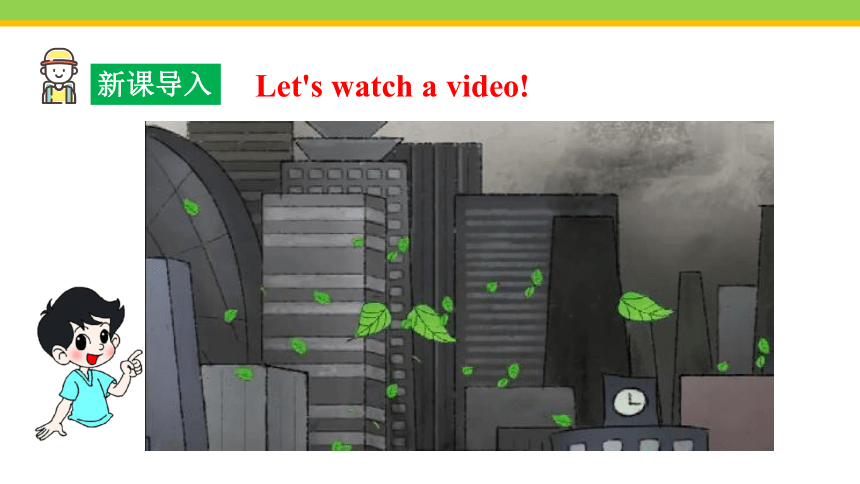

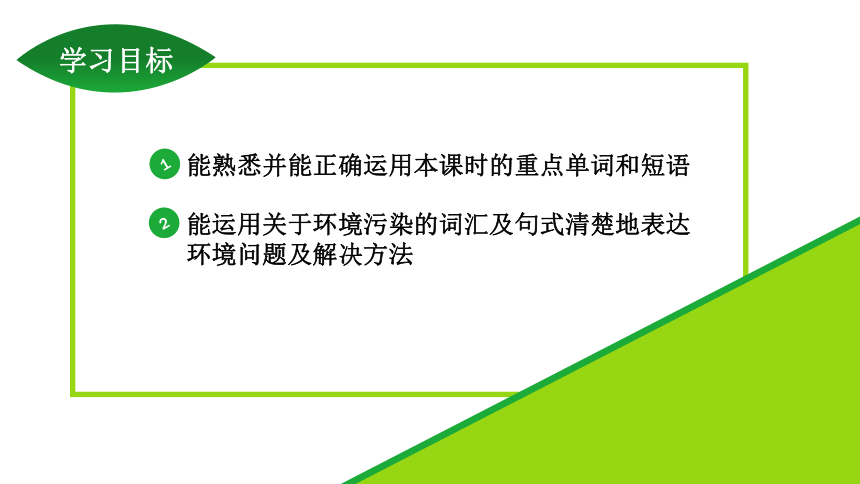
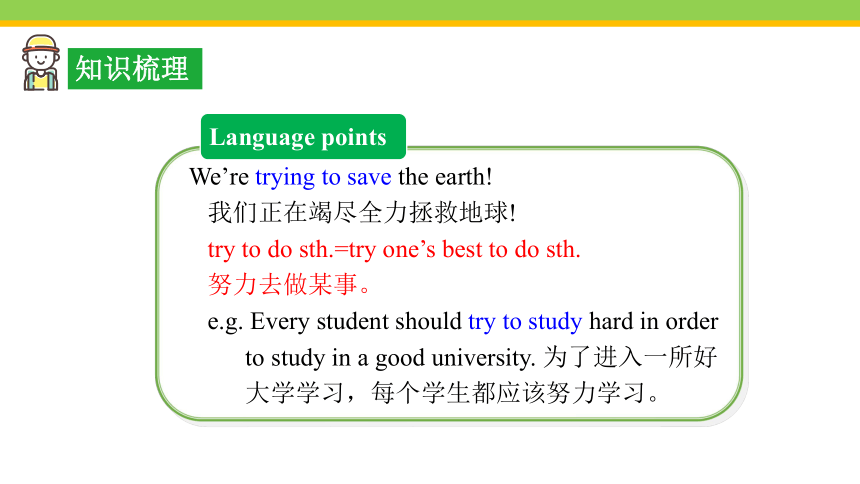


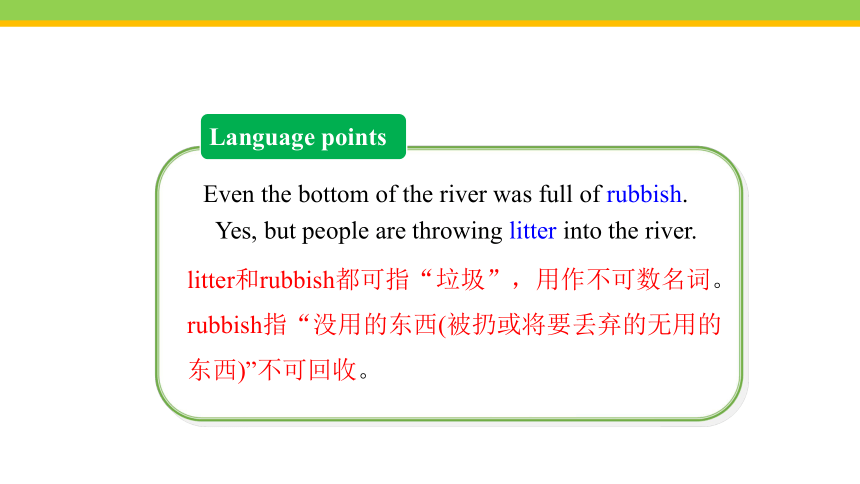


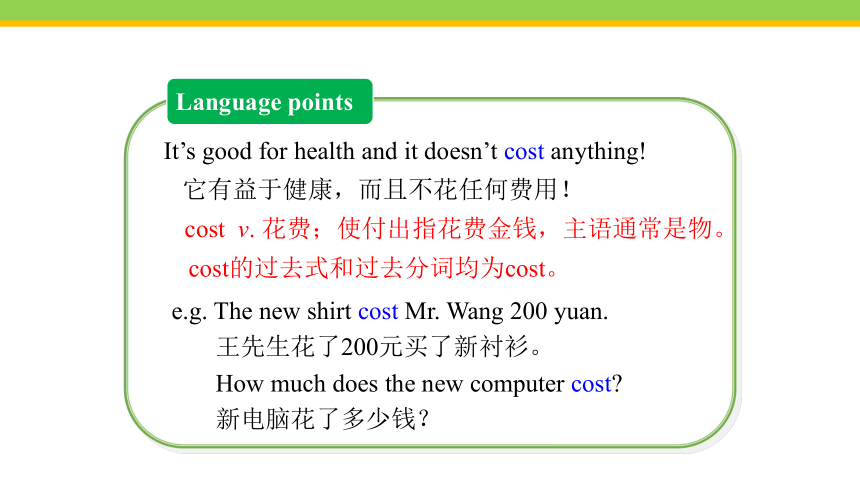

文档简介
(共43张PPT)
Unit 13
We're trying to save the earth!
Section A (1a~2d)
新课导入
Let's watch a video!
新课导入
Free talk
The earth is polluted.
What is your greatest impression after watching the video
2
1
能熟悉并能正确运用本课时的重点单词和短语
能运用关于环境污染的词汇及句式清楚地表达环境问题及解决方法
知识梳理
Language points
We’re trying to save the earth!
我们正在竭尽全力拯救地球!
try to do sth.=try one’s best to do sth.
努力去做某事。
e.g. Every student should try to study hard in order
to study in a good university. 为了进入一所好
大学学习,每个学生都应该努力学习。
Language points
Here are some words related to different kinds of pollution.这里有一些与不同类型的污染有关的词。
be related to 与……有关
e.g. I am not related to him in any way.
我和他无任何关系。
Language points
Everyone in this town should play a part in cleaning it up!这个镇上的每个人都应该参与清理工作!
play a part in 在……方面起作用
e.g. A good diet plays a large part in helping people live
longer. 健康的饮食在帮助人们长寿方面起着
非常大的作用。
Language points
Even the bottom of the river was full of rubbish.
Yes, but people are throwing litter into the river.
litter和rubbish都可指“垃圾”,用作不可数名词。
rubbish指“没用的东西(被扔或将要丢弃的无用的东西)”不可回收。
Language points
litter指“(室内或公共场所)乱扔的废物(纸屑、不要的包装纸、废瓶等)”还可回收。
e.g. Throw the rubbish out.
把垃圾扔出去。
The room is full of rubbish.
房间里堆满了垃圾。
Pick up your litter after a picnic.
野餐后将废弃物收拾好。
Language points
This is turning beautiful places into ugly ones.
这将美丽的地方变成丑陋的地方。
turn… into… 把……变成……
e.g. The icy rain seemed like to turn into snow.
冻雨似乎又变成雪花的模样。
Language points
It’s good for health and it doesn’t cost anything!
它有益于健康,而且不花任何费用!
cost v. 花费;使付出指花费金钱,主语通常是物。cost的过去式和过去分词均为cost。
e.g. The new shirt cost Mr. Wang 200 yuan.
王先生花了200元买了新衬衫。
How much does the new computer cost
新电脑花了多少钱?
Language points
So together, our actions can make a difference and lead to a better future!
make a difference (to…) (对……)产生影响或作用
e.g. Do you think his words would make
any difference to the final decision
你认为他的话会对最后的决定产生影响吗?
The new teacher always encourages little
Tom. This has made a big difference to him.
新来的老师总是鼓励小汤姆。这对他影响很大。
重点探究
用英文谈论现存的空气污染、水污染、噪声污染等问题
air pollution
The factories that burn coal pollute the air with a lot of
black smoke.
n. 煤炭
Factories put waste into the river.
water pollution
mobile phone pollution
litter v. 乱扔
n. 垃圾
rubbish waste
垃圾,废弃物
People should throw away litter in the bin.
n. 垃圾箱
noise pollution
There are more
cars on the road.
1a Here are some words related to different kinds of pollution. Write them in the box below. Then add more words.
noise pollution
____________
____________
____________
____________
air pollution
___________
___________
___________
___________
water pollution
____________
____________
____________
____________
loud music
planes
mobile phones
factories
cars
smoking
ships
factories
littering
rubbish
building houses
building houses
loud music cars rubbish planes
littering ships factories smoking
building houses mobile phones
1b Listen and complete the sentences.
What was the problem The river was _____.Even the bottom of the river was full of________. There were no more _____ for fishermen to catch.
What caused the problem People are throwing _____ into the river. Factories are putting _____ into the river.
How should the problem be solved We should write to the _____________
and ask them to ___________the factories. Everyone should help to _______ the river.
dirty
rubbish
fish
litter
waste
government
close down
clean up
Listen again and answer the questions.
What does Tony want to do later this afternoon
Why doesn’t Mark want to go with Tony
How was the river in the past
He wants to go swimming with Mark in the river later this afternoon.
Because the river was really dirty. Even the bottom of the river was full of rubbish, and there were no more fish for fishermen to catch.
It used to be so clean. It has been the nicest river in this town.
Check your answers and then role-play the conversation.
Tony: Hey, Mark, maybe we could go swimming in the
river later this afternoon.
Mark: I don’t think I want to go, Tony.
Tony: Why not
Mark: I was there last weekend and the river was really dirty.
Even the bottom of the river was full of rubbish, and
there were no more fish for fishermen to catch.
Tony: No way! It used to be so clean. In fact, it has always
been the nicest river in this town.
Mark: Not anymore. I think people are throwing litter into
the river. Factories are also putting waste into the river.
Tony: That’s terrible! We should write to the government.
They should close down the factories.
Mark: Good idea! But I think everyone in this town should
help to clean up the river, too. Everyone should play
a part, not just the government.
1c Then make your own conversations about the
kinds of pollution in 1a.
2
Mark:The river was dirty. Even the bottom
of the river was full of rubbish.
Tony: But it used to be so clean!
Mark:Yes,but people are throwing litter
into the river.
Tony:Everyone in this town should play a
part in cleaning it up!
小组展示
1 组
2 组
3 组
4 组
活动小结
通过以上的活动,我们能运用英文谈论现存的
_________、_________、_________等环境污染问题。
空气污染
水污染
噪声污染
思考保护环境的方法
Look and say
重点探究
I'm going to get some ________. Do you want some
takeaway
Look at the pictures and fill in the blanks.
Look and say
About 2% of fast-food packaging ends up as ______.
litter
Dirty clothes _______ the floor of her bedroom.
littered
Look and say
cost
Look and say
Thousands of bags end up as ______.
litter
It's everyone’s duty to protect the environment. And it should begin from every aspect of our daily life. Only by changing the way we treat the environment can we get along well with it. Only by saving the environment can we save ourselves.
2a Listen to the interview. Circle the kinds of pollution
that Jason and Susan talk about.
A. land pollution
B. air pollution
C. noise pollution
D. water pollution
2b Listen again and complete the sentences.
1.The air is badly polluted because there are __________on the
road these days.
2.Factories that burn coal also ________ the air with a lot of
black smoke.
3.There is also too much rubbish and waste. People _________
________things every day.
4.People are also littering in _____________ like parks. This
is turning beautiful places into ugly ones.
more cars
are throwing
away
pollute
public places
Check your answers and then role-play the conversation.
Interviewer: Today we’re talking to Jason and Susan about
environmental problems. Jason and Susan, can you
tell us about some of the problems you’ve seen
Jason: I think one problem is that the air is badly polluted.
I hardly ever see blue skies anymore.
Susan: Yes, and I used to see the stars clearly.
Interviewer: What do you think has caused this problem
Susan: Well, there are more cars on the road these days.
Jason: And factories that burn coal also pollute the air
with a lot black smoke.
Interviewer: What other problems do you see
Susan: I guess there’s too much rubbish and waste in the
streets.
Jason: Yes! Every day people are throwing away things like
wooden chopsticks, plastic bowls and plastic bags.
Susan: They’re also littering in public places, for example,
during picnics in parks. This is turning beautiful
places into ugly ones.
Interviewer: You’re right. These are serious problems for our
environment. Next, let’s talk about the things we
can do to help.
“火眼金睛”
请快速找出2d.中含有保护环境的方法的句子。
I think simple things like bringing a bag to go shopping can help.
Well, to cut down air pollution, we should take the
bus or subway instead of driving.Yeah, or ride a bike.
Also, I never take wooden chopsticks or plastic forks when I buy takeaway food.
And remember to throw rubbish in the bins and keep
public places clean and beautiful for everyone.
2d Role-play the conversation.
Interviewer: Jason and Susan, what are your ideas for
solving these problems
Jason: Well, to cut down air pollution, we should take the
bus or subway instead of driving.
Susan: Yeah, or ride a bike. There are other advantages of
bike riding. It’s good for health and it doesn’t cost
anything!
Interviewer: Great ideas! What about waste pollution
Susan: Mmm, I think simple things like bringing a bag to go
shopping can help. I started doing that a year ago.
Jason: Me, too. Also, I never take wooden chopsticks or plastic
forks when I buy takeaway food. I use the ones at home.
Susan: And remember to throw rubbish in the bins and keep
public places clean and beautiful for everyone.
Interviewer: So together, our actions can make a
difference and lead to better future!
Complete the chart.
Problems Solving problems
air pollution
waste pollution
rubbish
take the bus, subway or ride a bike instead of driving
bring a bag to go shopping, never
take wooden chopsticks or plastic forks but use the ones at home while buying takeway food
throw rubbish in the bins
活动小结
通过以上的活动,我们可以针对不同的环境问题思考出不同的方法。面对空气污染,我们可以______________
________________________________等;对于浪费等行为,我们可以_______________________________________
_______________________________________________
__________________等;针对垃圾,我们要_______________。
take the bus, subway or ride a bike instead of driving
bring a bag to go shopping, never take wooden chopsticks or plastic forks but use the ones at home while buying takeway food
throw it in the bins
当堂检测
一、根据首字母提示完成单词。
1.I think Jane's kite is beautiful.However, Tina's is u____.
2.As you can see, our desks are w______, not plastic.
3.There are tea leaves in the b______ of my cup.
4.People who drop l_____can be fined (罚款) in some cities.
5.Yao Ming's height gives him a big a________over other
players.(恩施)
gly
ooden
ottom
itter
dvantage
二、用所给词的适当形式填空。
6.This method can make a__________(different)in our life.
7.The lake is dirty.It used______(be)very clean.
8.The air is_______(bad)polluted because there are too many
cars.
9.We can take the taxi instead of_________(drive)the car.
10.Remember_________(throw)rubbish in the bins and keep
public places clean and beautiful.
difference
to be
badly
driving
to throw
课堂总结
重要短语:
try to do sth.=try one’s best to do sth. 努力去做某事。
be related to 与……有关
play a part in在……方面起作用
play a part 在……中扮演角色
turn… into… 把……变成……
make a difference (to…)
(对……)产生影响或作用
能运用关于环境污染的词汇及句式清楚地表达环境问题及解决方法
Unit 13 Section A (1a~2d)
Unit 13
We're trying to save the earth!
Section A (1a~2d)
新课导入
Let's watch a video!
新课导入
Free talk
The earth is polluted.
What is your greatest impression after watching the video
2
1
能熟悉并能正确运用本课时的重点单词和短语
能运用关于环境污染的词汇及句式清楚地表达环境问题及解决方法
知识梳理
Language points
We’re trying to save the earth!
我们正在竭尽全力拯救地球!
try to do sth.=try one’s best to do sth.
努力去做某事。
e.g. Every student should try to study hard in order
to study in a good university. 为了进入一所好
大学学习,每个学生都应该努力学习。
Language points
Here are some words related to different kinds of pollution.这里有一些与不同类型的污染有关的词。
be related to 与……有关
e.g. I am not related to him in any way.
我和他无任何关系。
Language points
Everyone in this town should play a part in cleaning it up!这个镇上的每个人都应该参与清理工作!
play a part in 在……方面起作用
e.g. A good diet plays a large part in helping people live
longer. 健康的饮食在帮助人们长寿方面起着
非常大的作用。
Language points
Even the bottom of the river was full of rubbish.
Yes, but people are throwing litter into the river.
litter和rubbish都可指“垃圾”,用作不可数名词。
rubbish指“没用的东西(被扔或将要丢弃的无用的东西)”不可回收。
Language points
litter指“(室内或公共场所)乱扔的废物(纸屑、不要的包装纸、废瓶等)”还可回收。
e.g. Throw the rubbish out.
把垃圾扔出去。
The room is full of rubbish.
房间里堆满了垃圾。
Pick up your litter after a picnic.
野餐后将废弃物收拾好。
Language points
This is turning beautiful places into ugly ones.
这将美丽的地方变成丑陋的地方。
turn… into… 把……变成……
e.g. The icy rain seemed like to turn into snow.
冻雨似乎又变成雪花的模样。
Language points
It’s good for health and it doesn’t cost anything!
它有益于健康,而且不花任何费用!
cost v. 花费;使付出指花费金钱,主语通常是物。cost的过去式和过去分词均为cost。
e.g. The new shirt cost Mr. Wang 200 yuan.
王先生花了200元买了新衬衫。
How much does the new computer cost
新电脑花了多少钱?
Language points
So together, our actions can make a difference and lead to a better future!
make a difference (to…) (对……)产生影响或作用
e.g. Do you think his words would make
any difference to the final decision
你认为他的话会对最后的决定产生影响吗?
The new teacher always encourages little
Tom. This has made a big difference to him.
新来的老师总是鼓励小汤姆。这对他影响很大。
重点探究
用英文谈论现存的空气污染、水污染、噪声污染等问题
air pollution
The factories that burn coal pollute the air with a lot of
black smoke.
n. 煤炭
Factories put waste into the river.
water pollution
mobile phone pollution
litter v. 乱扔
n. 垃圾
rubbish waste
垃圾,废弃物
People should throw away litter in the bin.
n. 垃圾箱
noise pollution
There are more
cars on the road.
1a Here are some words related to different kinds of pollution. Write them in the box below. Then add more words.
noise pollution
____________
____________
____________
____________
air pollution
___________
___________
___________
___________
water pollution
____________
____________
____________
____________
loud music
planes
mobile phones
factories
cars
smoking
ships
factories
littering
rubbish
building houses
building houses
loud music cars rubbish planes
littering ships factories smoking
building houses mobile phones
1b Listen and complete the sentences.
What was the problem The river was _____.Even the bottom of the river was full of________. There were no more _____ for fishermen to catch.
What caused the problem People are throwing _____ into the river. Factories are putting _____ into the river.
How should the problem be solved We should write to the _____________
and ask them to ___________the factories. Everyone should help to _______ the river.
dirty
rubbish
fish
litter
waste
government
close down
clean up
Listen again and answer the questions.
What does Tony want to do later this afternoon
Why doesn’t Mark want to go with Tony
How was the river in the past
He wants to go swimming with Mark in the river later this afternoon.
Because the river was really dirty. Even the bottom of the river was full of rubbish, and there were no more fish for fishermen to catch.
It used to be so clean. It has been the nicest river in this town.
Check your answers and then role-play the conversation.
Tony: Hey, Mark, maybe we could go swimming in the
river later this afternoon.
Mark: I don’t think I want to go, Tony.
Tony: Why not
Mark: I was there last weekend and the river was really dirty.
Even the bottom of the river was full of rubbish, and
there were no more fish for fishermen to catch.
Tony: No way! It used to be so clean. In fact, it has always
been the nicest river in this town.
Mark: Not anymore. I think people are throwing litter into
the river. Factories are also putting waste into the river.
Tony: That’s terrible! We should write to the government.
They should close down the factories.
Mark: Good idea! But I think everyone in this town should
help to clean up the river, too. Everyone should play
a part, not just the government.
1c Then make your own conversations about the
kinds of pollution in 1a.
2
Mark:The river was dirty. Even the bottom
of the river was full of rubbish.
Tony: But it used to be so clean!
Mark:Yes,but people are throwing litter
into the river.
Tony:Everyone in this town should play a
part in cleaning it up!
小组展示
1 组
2 组
3 组
4 组
活动小结
通过以上的活动,我们能运用英文谈论现存的
_________、_________、_________等环境污染问题。
空气污染
水污染
噪声污染
思考保护环境的方法
Look and say
重点探究
I'm going to get some ________. Do you want some
takeaway
Look at the pictures and fill in the blanks.
Look and say
About 2% of fast-food packaging ends up as ______.
litter
Dirty clothes _______ the floor of her bedroom.
littered
Look and say
cost
Look and say
Thousands of bags end up as ______.
litter
It's everyone’s duty to protect the environment. And it should begin from every aspect of our daily life. Only by changing the way we treat the environment can we get along well with it. Only by saving the environment can we save ourselves.
2a Listen to the interview. Circle the kinds of pollution
that Jason and Susan talk about.
A. land pollution
B. air pollution
C. noise pollution
D. water pollution
2b Listen again and complete the sentences.
1.The air is badly polluted because there are __________on the
road these days.
2.Factories that burn coal also ________ the air with a lot of
black smoke.
3.There is also too much rubbish and waste. People _________
________things every day.
4.People are also littering in _____________ like parks. This
is turning beautiful places into ugly ones.
more cars
are throwing
away
pollute
public places
Check your answers and then role-play the conversation.
Interviewer: Today we’re talking to Jason and Susan about
environmental problems. Jason and Susan, can you
tell us about some of the problems you’ve seen
Jason: I think one problem is that the air is badly polluted.
I hardly ever see blue skies anymore.
Susan: Yes, and I used to see the stars clearly.
Interviewer: What do you think has caused this problem
Susan: Well, there are more cars on the road these days.
Jason: And factories that burn coal also pollute the air
with a lot black smoke.
Interviewer: What other problems do you see
Susan: I guess there’s too much rubbish and waste in the
streets.
Jason: Yes! Every day people are throwing away things like
wooden chopsticks, plastic bowls and plastic bags.
Susan: They’re also littering in public places, for example,
during picnics in parks. This is turning beautiful
places into ugly ones.
Interviewer: You’re right. These are serious problems for our
environment. Next, let’s talk about the things we
can do to help.
“火眼金睛”
请快速找出2d.中含有保护环境的方法的句子。
I think simple things like bringing a bag to go shopping can help.
Well, to cut down air pollution, we should take the
bus or subway instead of driving.Yeah, or ride a bike.
Also, I never take wooden chopsticks or plastic forks when I buy takeaway food.
And remember to throw rubbish in the bins and keep
public places clean and beautiful for everyone.
2d Role-play the conversation.
Interviewer: Jason and Susan, what are your ideas for
solving these problems
Jason: Well, to cut down air pollution, we should take the
bus or subway instead of driving.
Susan: Yeah, or ride a bike. There are other advantages of
bike riding. It’s good for health and it doesn’t cost
anything!
Interviewer: Great ideas! What about waste pollution
Susan: Mmm, I think simple things like bringing a bag to go
shopping can help. I started doing that a year ago.
Jason: Me, too. Also, I never take wooden chopsticks or plastic
forks when I buy takeaway food. I use the ones at home.
Susan: And remember to throw rubbish in the bins and keep
public places clean and beautiful for everyone.
Interviewer: So together, our actions can make a
difference and lead to better future!
Complete the chart.
Problems Solving problems
air pollution
waste pollution
rubbish
take the bus, subway or ride a bike instead of driving
bring a bag to go shopping, never
take wooden chopsticks or plastic forks but use the ones at home while buying takeway food
throw rubbish in the bins
活动小结
通过以上的活动,我们可以针对不同的环境问题思考出不同的方法。面对空气污染,我们可以______________
________________________________等;对于浪费等行为,我们可以_______________________________________
_______________________________________________
__________________等;针对垃圾,我们要_______________。
take the bus, subway or ride a bike instead of driving
bring a bag to go shopping, never take wooden chopsticks or plastic forks but use the ones at home while buying takeway food
throw it in the bins
当堂检测
一、根据首字母提示完成单词。
1.I think Jane's kite is beautiful.However, Tina's is u____.
2.As you can see, our desks are w______, not plastic.
3.There are tea leaves in the b______ of my cup.
4.People who drop l_____can be fined (罚款) in some cities.
5.Yao Ming's height gives him a big a________over other
players.(恩施)
gly
ooden
ottom
itter
dvantage
二、用所给词的适当形式填空。
6.This method can make a__________(different)in our life.
7.The lake is dirty.It used______(be)very clean.
8.The air is_______(bad)polluted because there are too many
cars.
9.We can take the taxi instead of_________(drive)the car.
10.Remember_________(throw)rubbish in the bins and keep
public places clean and beautiful.
difference
to be
badly
driving
to throw
课堂总结
重要短语:
try to do sth.=try one’s best to do sth. 努力去做某事。
be related to 与……有关
play a part in在……方面起作用
play a part 在……中扮演角色
turn… into… 把……变成……
make a difference (to…)
(对……)产生影响或作用
能运用关于环境污染的词汇及句式清楚地表达环境问题及解决方法
Unit 13 Section A (1a~2d)
同课章节目录
- Unit 1 How can we become good learners.
- Section A
- Section B
- Unit 2 I think that mooncakes are delicious!
- Section A
- Section B
- Unit 3 Could you please tell me where the restroom
- Section A
- Section B
- Unit 4 I used to be afraid of the dark.
- Section A
- Section B
- Unit 5 What are the shirts made of?
- Section A
- Section B
- Review of Units 1-5
- Unit 6 When was it invented?
- Section A
- Section B
- Unit 7 Teenagers should be allowed to choose their
- Section A
- Section B
- Unit 8 It must belong to Carla.
- Section A
- Section B
- Unit 9 I like music that I can dance to.
- Section A
- Section B
- Unit 10 You're supposed to shake hands.
- Section A
- Section B
- Review of Units 6-10
- Unit 11 Sad movies make me cry.
- Section A
- Section B
- Unit 12 Life is full of the unexpected
- Section A
- Section B
- Unit 13 We're trying to save the earth!
- Section A
- Section B
- Unit 14 I remember meeting all of you in Grade 7.
- Section A
- Section B
- Review of Units 11-14
